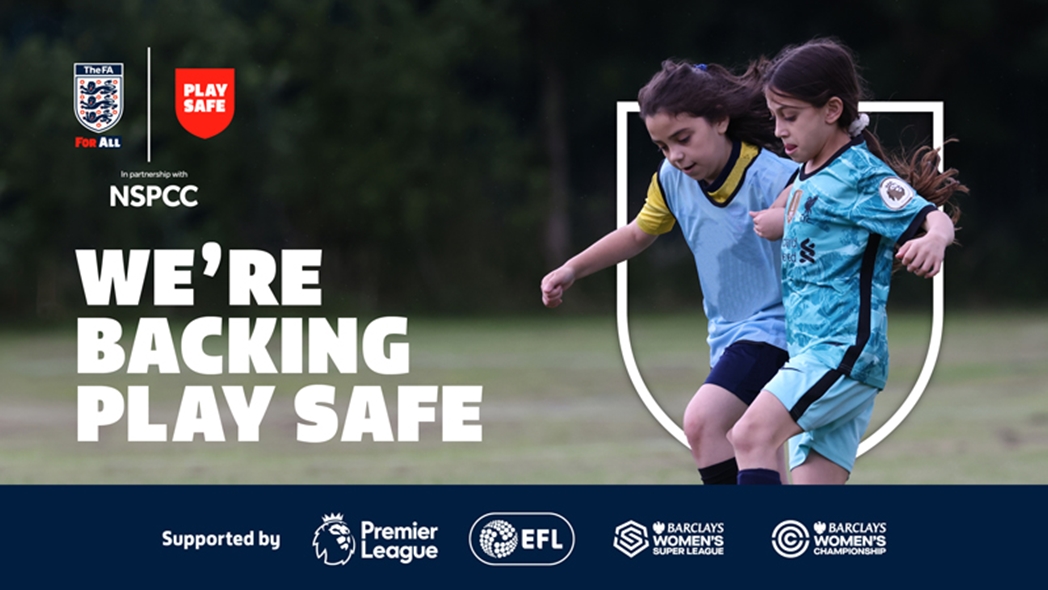English football will unite this weekend [1st/2nd October 2022] to promote Play Safe – a countrywide campaign to focus attention on the vital importance of safeguarding in our national game.
Led by The FA, the Play Safe campaign is endorsed by the National Society for the Prevention of Cruelty to Children [NSPCC] and will be supported this weekend across every level of English football, including the Premier League, EFL, Barclays Women’s Super League and Barclays Women’s Championship, and across the grassroots game.
The focus of this year’s Play Safe campaign is on the key role of parents and carers in safeguarding and to raise awareness of the vital role that safeguarding plays in football. Parents and carers are also being encouraged to take the new and free online safeguarding course specifically developed for them, which can be accessed HERE.
The FA’s Survivor Support and Safeguarding Advisory Group [FASSSAG] has also added its support to the Play Safe campaign and are encouraging parents and carers to take the new online course, adding:
“We have inputted into the course and helped frame its key messages from our collective experiences. It’s vitally important to us that every parent and carer understands the role they need to play in football. Taking this course can make a real difference – and we are asking every parent and carer to commit to help ensure football is ever-safer.”
The FA’s CEO Mark Bullingham, himself a parent and youth football coach, has welcomed the support of the FASSSAG, saying: “The FASSSAG has played an important role in helping us create our new safeguarding strategy and we greatly appreciate their input into the new online course. I have taken the new course and encourage all parents and carers across football to take it too.
“Ultimately, safeguarding is everyone’s responsibility. We all need to ensure that everyone involved in football – particularly children and young people – has a consistently safe and positive experience of our great game. Our Play Safe campaign reminds everyone of that responsibility and keeps safeguarding front of mind, which is exactly where it should be.”
Michelle North, Service Head of the NSPCC’s Child Protection in Sport Unit [CPSU], said: “Children and young people have a right to enjoy all sports including football with the confidence they will be safe. Everyone involved in sport has a role to play in preventing abuse, and so we’re pleased The FA is putting a spotlight on safeguarding in football through the Play Safe weekend, which runs ahead of our own Keeping Your Child Safe in Sport Week 3-9 October.
“We know from our experience that parents and carers can play a crucial role – and we’d encourage anyone whose children play football to check out The FA’s new free online course. If anyone who has concerns about the safety of a child, they can call the NSPCC FA-designated helpline on 0808 800 5000.”
To help all parts of football support Play Safe, various digital and print resources are being distributed as well as links to two short films, one featuring the views of FASSSAG members.
The FA’s Head of Safeguarding Sue Ravenlaw added: “Play Safe demonstrates that across the game we are all united and committed to keep children and young people safe in football.
“As adults, it’s essential we all work together – including with parents and carers – to create positive football settings where children thrive and feel confident to speak up if they are not feeling ok.
“Backing the Play Safe campaign gives clubs and leagues a specific moment early in the season to talk with parents, carers, players, coaches, managers, first aiders and spectators to reinforce their safeguarding practices and expectations of everyone involved.
“Behind everything is one core message: whatever your role in football – whether an active participant or an administrator – safeguarding is everyone’s responsibility. Play Safe naturally aligns with and shows our support for the NSPCC’s Keeping Your Child Safe in Sport Week campaign.”
You can read more about Play Safe and watch related films HERE.
Further information about the NSPCC’s Keeping Your Child Safe in Sport Week is available HERE.

